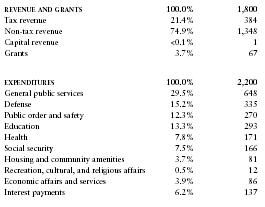Bahrain - Public finance
The budget is presented biennually and regularly updated, and represents a large section of economic activity. More than half of government revenues come from oil production and refining; the oil industry is completely controlled by the government. The public deficit is covered by internal borrowing, loans from Arab funds, and the IDB; although privatization has become increasingly important to controlling the budget. The oil and aluminum industries are still controlled by the government, although utilities, banks, financial services, and telecommunications have started to fall into private hands.
The US Central Intelligence Agency (CIA) estimates that in 2002 Bahrain's central government took in revenues of approximately $1.8 billion and had expenditures of $2.2 billion including capital expenditures of $700 million. Overall, the government registered a deficit of approximately $400 million. External debt totaled $2.8 billion.
The following table shows an itemized breakdown of government revenues and expenditures. The percentages were calculated from data reported by the International Monetary Fund. The dollar amounts (millions) are based on the CIA estimates provided above.

| REVENUE AND GRANTS | 100.0% | 1,800 |
| Tax revenue | 21.4% | 384 |
| Non-tax revenue | 74.9% | 1,348 |
| Capital revenue | <0.1% | 1 |
| Grants | 3.7% | 67 |
| EXPENDITURES | 100.0% | 2,200 |
| General public services | 29.5% | 648 |
| Defense | 15.2% | 335 |
| Public order and safety | 12.3% | 270 |
| Education | 13.3% | 293 |
| Health | 7.8% | 171 |
| Social security | 7.5% | 166 |
| Housing and community amenities | 3.7% | 81 |
| Recreation, cultural, and religious affairs | 0.5% | 12 |
| Economic affairs and services | 3.9% | 86 |
| Interest payments | 6.2% | 137 |
Comment about this article, ask questions, or add new information about this topic: